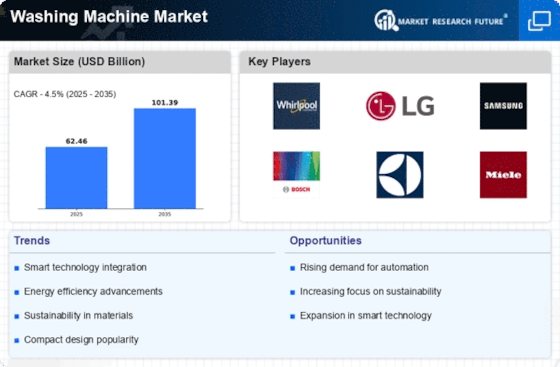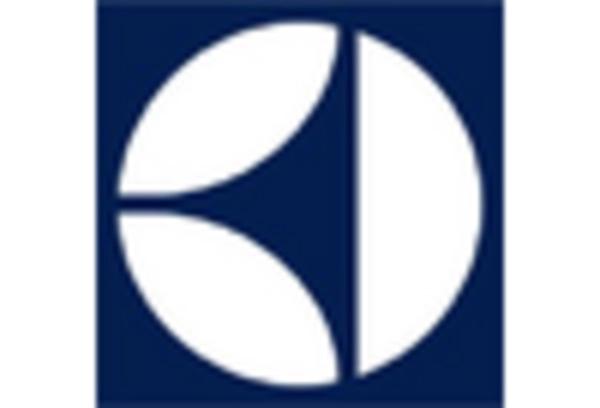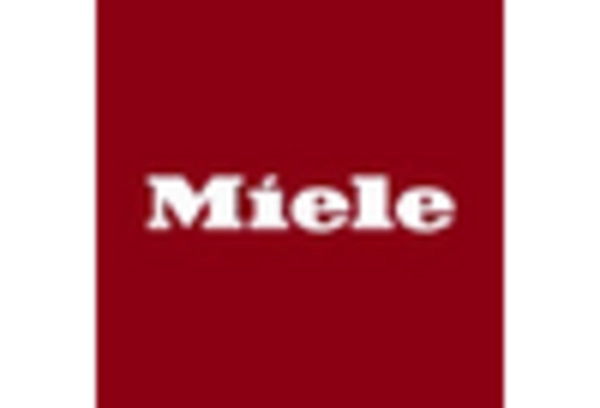- Washing Machine Market By Type (USD Billion, 2019-2035)
- Front Load
- Top Load
- Washer Dryer Combo
- Compact
- Washing Machine Market By Technology (USD Billion, 2019-2035)
- Fully Automatic
- Semi-Automatic
- Manual
- Washing Machine Market By Capacity (USD Billion, 2019-2035)
- Below 6 Kg
- 6-8 Kg
- Above 8 Kg
- Washing Machine Market By End Use (USD Billion, 2019-2035)
- Washing Machine Market By Regional (USD Billion, 2019-2035)
- North America
- Europe
- South America
- Asia Pacific
- Middle East and Africa
North America Outlook (USD Billion, 2019-2035)
Washing Machine Market by Type
Front Load
Top Load
Washer Dryer Combo
Compact
Washing Machine Market by Technology Type
Fully Automatic
Semi-Automatic
Manual
Washing Machine Market by Capacity Type
Below 6 Kg
6-8 Kg
Above 8 Kg
Washing Machine Market by End Use Type
Residential
Commercial
Washing Machine Market by Regional Type
US
Canada
US Outlook (USD Billion, 2019-2035)
Washing Machine Market by Type
Front Load
Top Load
Washer Dryer Combo
Compact
Washing Machine Market by Technology Type
Fully Automatic
Semi-Automatic
Manual
Washing Machine Market by Capacity Type
Below 6 Kg
6-8 Kg
Above 8 Kg
Washing Machine Market by End Use Type
Residential
Commercial
CANADA Outlook (USD Billion, 2019-2035)
Washing Machine Market by Type
Front Load
Top Load
Washer Dryer Combo
Compact
Washing Machine Market by Technology Type
Fully Automatic
Semi-Automatic
Manual
Washing Machine Market by Capacity Type
Below 6 Kg
6-8 Kg
Above 8 Kg
Washing Machine Market by End Use Type
Residential
Commercial
Europe Outlook (USD Billion, 2019-2035)
Washing Machine Market by Type
Front Load
Top Load
Washer Dryer Combo
Compact
Washing Machine Market by Technology Type
Fully Automatic
Semi-Automatic
Manual
Washing Machine Market by Capacity Type
Below 6 Kg
6-8 Kg
Above 8 Kg
Washing Machine Market by End Use Type
Residential
Commercial
Washing Machine Market by Regional Type
Germany
UK
France
Russia
Italy
Spain
Rest of Europe
GERMANY Outlook (USD Billion, 2019-2035)
Washing Machine Market by Type
Front Load
Top Load
Washer Dryer Combo
Compact
Washing Machine Market by Technology Type
Fully Automatic
Semi-Automatic
Manual
Washing Machine Market by Capacity Type
Below 6 Kg
6-8 Kg
Above 8 Kg
Washing Machine Market by End Use Type
Residential
Commercial
UK Outlook (USD Billion, 2019-2035)
Washing Machine Market by Type
Front Load
Top Load
Washer Dryer Combo
Compact
Washing Machine Market by Technology Type
Fully Automatic
Semi-Automatic
Manual
Washing Machine Market by Capacity Type
Below 6 Kg
6-8 Kg
Above 8 Kg
Washing Machine Market by End Use Type
Residential
Commercial
FRANCE Outlook (USD Billion, 2019-2035)
Washing Machine Market by Type
Front Load
Top Load
Washer Dryer Combo
Compact
Washing Machine Market by Technology Type
Fully Automatic
Semi-Automatic
Manual
Washing Machine Market by Capacity Type
Below 6 Kg
6-8 Kg
Above 8 Kg
Washing Machine Market by End Use Type
Residential
Commercial
RUSSIA Outlook (USD Billion, 2019-2035)
Washing Machine Market by Type
Front Load
Top Load
Washer Dryer Combo
Compact
Washing Machine Market by Technology Type
Fully Automatic
Semi-Automatic
Manual
Washing Machine Market by Capacity Type
Below 6 Kg
6-8 Kg
Above 8 Kg
Washing Machine Market by End Use Type
Residential
Commercial
ITALY Outlook (USD Billion, 2019-2035)
Washing Machine Market by Type
Front Load
Top Load
Washer Dryer Combo
Compact
Washing Machine Market by Technology Type
Fully Automatic
Semi-Automatic
Manual
Washing Machine Market by Capacity Type
Below 6 Kg
6-8 Kg
Above 8 Kg
Washing Machine Market by End Use Type
Residential
Commercial
SPAIN Outlook (USD Billion, 2019-2035)
Washing Machine Market by Type
Front Load
Top Load
Washer Dryer Combo
Compact
Washing Machine Market by Technology Type
Fully Automatic
Semi-Automatic
Manual
Washing Machine Market by Capacity Type
Below 6 Kg
6-8 Kg
Above 8 Kg
Washing Machine Market by End Use Type
Residential
Commercial
REST OF EUROPE Outlook (USD Billion, 2019-2035)
Washing Machine Market by Type
Front Load
Top Load
Washer Dryer Combo
Compact
Washing Machine Market by Technology Type
Fully Automatic
Semi-Automatic
Manual
Washing Machine Market by Capacity Type
Below 6 Kg
6-8 Kg
Above 8 Kg
Washing Machine Market by End Use Type
Residential
Commercial
APAC Outlook (USD Billion, 2019-2035)
Washing Machine Market by Type
Front Load
Top Load
Washer Dryer Combo
Compact
Washing Machine Market by Technology Type
Fully Automatic
Semi-Automatic
Manual
Washing Machine Market by Capacity Type
Below 6 Kg
6-8 Kg
Above 8 Kg
Washing Machine Market by End Use Type
Residential
Commercial
Washing Machine Market by Regional Type
China
India
Japan
South Korea
Malaysia
Thailand
Indonesia
Rest of APAC
CHINA Outlook (USD Billion, 2019-2035)
Washing Machine Market by Type
Front Load
Top Load
Washer Dryer Combo
Compact
Washing Machine Market by Technology Type
Fully Automatic
Semi-Automatic
Manual
Washing Machine Market by Capacity Type
Below 6 Kg
6-8 Kg
Above 8 Kg
Washing Machine Market by End Use Type
Residential
Commercial
INDIA Outlook (USD Billion, 2019-2035)
Washing Machine Market by Type
Front Load
Top Load
Washer Dryer Combo
Compact
Washing Machine Market by Technology Type
Fully Automatic
Semi-Automatic
Manual
Washing Machine Market by Capacity Type
Below 6 Kg
6-8 Kg
Above 8 Kg
Washing Machine Market by End Use Type
Residential
Commercial
JAPAN Outlook (USD Billion, 2019-2035)
Washing Machine Market by Type
Front Load
Top Load
Washer Dryer Combo
Compact
Washing Machine Market by Technology Type
Fully Automatic
Semi-Automatic
Manual
Washing Machine Market by Capacity Type
Below 6 Kg
6-8 Kg
Above 8 Kg
Washing Machine Market by End Use Type
Residential
Commercial
SOUTH KOREA Outlook (USD Billion, 2019-2035)
Washing Machine Market by Type
Front Load
Top Load
Washer Dryer Combo
Compact
Washing Machine Market by Technology Type
Fully Automatic
Semi-Automatic
Manual
Washing Machine Market by Capacity Type
Below 6 Kg
6-8 Kg
Above 8 Kg
Washing Machine Market by End Use Type
Residential
Commercial
MALAYSIA Outlook (USD Billion, 2019-2035)
Washing Machine Market by Type
Front Load
Top Load
Washer Dryer Combo
Compact
Washing Machine Market by Technology Type
Fully Automatic
Semi-Automatic
Manual
Washing Machine Market by Capacity Type
Below 6 Kg
6-8 Kg
Above 8 Kg
Washing Machine Market by End Use Type
Residential
Commercial
THAILAND Outlook (USD Billion, 2019-2035)
Washing Machine Market by Type
Front Load
Top Load
Washer Dryer Combo
Compact
Washing Machine Market by Technology Type
Fully Automatic
Semi-Automatic
Manual
Washing Machine Market by Capacity Type
Below 6 Kg
6-8 Kg
Above 8 Kg
Washing Machine Market by End Use Type
Residential
Commercial
INDONESIA Outlook (USD Billion, 2019-2035)
Washing Machine Market by Type
Front Load
Top Load
Washer Dryer Combo
Compact
Washing Machine Market by Technology Type
Fully Automatic
Semi-Automatic
Manual
Washing Machine Market by Capacity Type
Below 6 Kg
6-8 Kg
Above 8 Kg
Washing Machine Market by End Use Type
Residential
Commercial
REST OF APAC Outlook (USD Billion, 2019-2035)
Washing Machine Market by Type
Front Load
Top Load
Washer Dryer Combo
Compact
Washing Machine Market by Technology Type
Fully Automatic
Semi-Automatic
Manual
Washing Machine Market by Capacity Type
Below 6 Kg
6-8 Kg
Above 8 Kg
Washing Machine Market by End Use Type
Residential
Commercial
South America Outlook (USD Billion, 2019-2035)
Washing Machine Market by Type
Front Load
Top Load
Washer Dryer Combo
Compact
Washing Machine Market by Technology Type
Fully Automatic
Semi-Automatic
Manual
Washing Machine Market by Capacity Type
Below 6 Kg
6-8 Kg
Above 8 Kg
Washing Machine Market by End Use Type
Residential
Commercial
Washing Machine Market by Regional Type
Brazil
Mexico
Argentina
Rest of South America
BRAZIL Outlook (USD Billion, 2019-2035)
Washing Machine Market by Type
Front Load
Top Load
Washer Dryer Combo
Compact
Washing Machine Market by Technology Type
Fully Automatic
Semi-Automatic
Manual
Washing Machine Market by Capacity Type
Below 6 Kg
6-8 Kg
Above 8 Kg
Washing Machine Market by End Use Type
Residential
Commercial
MEXICO Outlook (USD Billion, 2019-2035)
Washing Machine Market by Type
Front Load
Top Load
Washer Dryer Combo
Compact
Washing Machine Market by Technology Type
Fully Automatic
Semi-Automatic
Manual
Washing Machine Market by Capacity Type
Below 6 Kg
6-8 Kg
Above 8 Kg
Washing Machine Market by End Use Type
Residential
Commercial
ARGENTINA Outlook (USD Billion, 2019-2035)
Washing Machine Market by Type
Front Load
Top Load
Washer Dryer Combo
Compact
Washing Machine Market by Technology Type
Fully Automatic
Semi-Automatic
Manual
Washing Machine Market by Capacity Type
Below 6 Kg
6-8 Kg
Above 8 Kg
Washing Machine Market by End Use Type
Residential
Commercial
REST OF SOUTH AMERICA Outlook (USD Billion, 2019-2035)
Washing Machine Market by Type
Front Load
Top Load
Washer Dryer Combo
Compact
Washing Machine Market by Technology Type
Fully Automatic
Semi-Automatic
Manual
Washing Machine Market by Capacity Type
Below 6 Kg
6-8 Kg
Above 8 Kg
Washing Machine Market by End Use Type
Residential
Commercial
MEA Outlook (USD Billion, 2019-2035)
Washing Machine Market by Type
Front Load
Top Load
Washer Dryer Combo
Compact
Washing Machine Market by Technology Type
Fully Automatic
Semi-Automatic
Manual
Washing Machine Market by Capacity Type
Below 6 Kg
6-8 Kg
Above 8 Kg
Washing Machine Market by End Use Type
Residential
Commercial
Washing Machine Market by Regional Type
GCC Countries
South Africa
Rest of MEA
GCC COUNTRIES Outlook (USD Billion, 2019-2035)
Washing Machine Market by Type
Front Load
Top Load
Washer Dryer Combo
Compact
Washing Machine Market by Technology Type
Fully Automatic
Semi-Automatic
Manual
Washing Machine Market by Capacity Type
Below 6 Kg
6-8 Kg
Above 8 Kg
Washing Machine Market by End Use Type
Residential
Commercial
SOUTH AFRICA Outlook (USD Billion, 2019-2035)
Washing Machine Market by Type
Front Load
Top Load
Washer Dryer Combo
Compact
Washing Machine Market by Technology Type
Fully Automatic
Semi-Automatic
Manual
Washing Machine Market by Capacity Type
Below 6 Kg
6-8 Kg
Above 8 Kg
Washing Machine Market by End Use Type
Residential
Commercial
REST OF MEA Outlook (USD Billion, 2019-2035)
Washing Machine Market by Type
Front Load
Top Load
Washer Dryer Combo
Compact
Washing Machine Market by Technology Type
Fully Automatic
Semi-Automatic
Manual
Washing Machine Market by Capacity Type
Below 6 Kg
6-8 Kg
Above 8 Kg
Washing Machine Market by End Use Type
Residential
Commercial



















Leave a Comment